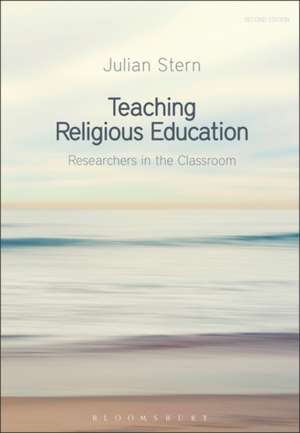Teaching Religious Education: Researchers in the Classroom
Autor Professor Julian Sternen Limba Engleză Paperback – 24 ian 2018
| Toate formatele și edițiile | Preț | Express |
|---|---|---|
| Paperback (1) | 179.56 lei 3-5 săpt. | |
| Bloomsbury Publishing – 24 ian 2018 | 179.56 lei 3-5 săpt. | |
| Hardback (1) | 540.15 lei 6-8 săpt. | |
| Bloomsbury Publishing – 24 ian 2018 | 540.15 lei 6-8 săpt. |
Preț: 179.56 lei
Preț vechi: 220.20 lei
-18% Nou
Puncte Express: 269
Preț estimativ în valută:
34.37€ • 35.42$ • 29.01£
34.37€ • 35.42$ • 29.01£
Carte disponibilă
Livrare economică 10-24 februarie
Preluare comenzi: 021 569.72.76
Specificații
ISBN-13: 9781350037090
ISBN-10: 1350037095
Pagini: 208
Dimensiuni: 169 x 244 x 15 mm
Greutate: 0.39 kg
Ediția:2
Editura: Bloomsbury Publishing
Colecția Bloomsbury Academic
Locul publicării:London, United Kingdom
ISBN-10: 1350037095
Pagini: 208
Dimensiuni: 169 x 244 x 15 mm
Greutate: 0.39 kg
Ediția:2
Editura: Bloomsbury Publishing
Colecția Bloomsbury Academic
Locul publicării:London, United Kingdom
Caracteristici
Designed to support teacher training, whether in universities or schools, as well as professional development and postgraduate courses throughout the religious education teacher's career
Notă biografică
Julian Stern is Professor of Education and Religion at Bishop Grosseteste University, UK. He is General Secretary of ISREV - the International Seminar on Religious Education and Values - an association of religious education scholars from more than 34 countries, and Editor of the British Journal of Religious Education.
Cuprins
Acknowledgements Preface to the Second Edition 1. Introduction: Inclusive RE:search 2. Dialogue Within and Between 3. The Real Lives of Teachers and Pupils in Religious Education 4. RE around the World 5. Understanding Pedagogy in Religious Education 6. Inclusion, Diversity and Religious Education 7. Working with Sacred Texts 8. Spirituality 9. Ethnographic Research in Communities 10. Thinking about Philosophy, Truth, and Religious Education 11. Ethics, Rights, Morality and Virtues 12. Creativity and RE 13. The Future of RE:search Bibliography Index
Recenzii
This book represents a useful tool for all those who have responsibility teaching RE to pupils in the primary school.
A distillation of the collective wisdom and experience of the RE practitioners ... A lively narrative combined with practical suggestions for innovative teaching and learning activities ... Every busy RE teacher should make the time to read this book.
The author's vision of RE does not shy from the problems of real life, and he produces a wealth of theoretical reflections and practical measures for researchers, teachers and pupils that should help all readers to take the subject forward, asking demanding questions of their own lives, and of the lives of others.
Rooted in the UK context, Teaching Religious Education provides opportunities for religious educators to reflect on their own practice in the light of teaching in other geographical regions. It also provides opportunities for religious education teachers in other regions to consider their own research and practice in light of insights on religious education in broader context.
When Stern speaks of empowering educators as researchers, he isn't merely telling what 'should' be done but actively models how to go about this through case studies, examples, and resources. The reader leaves with more than just passion having a vision of what research-infused RE might look like in their classroom.
A distillation of the collective wisdom and experience of the RE practitioners ... A lively narrative combined with practical suggestions for innovative teaching and learning activities ... Every busy RE teacher should make the time to read this book.
The author's vision of RE does not shy from the problems of real life, and he produces a wealth of theoretical reflections and practical measures for researchers, teachers and pupils that should help all readers to take the subject forward, asking demanding questions of their own lives, and of the lives of others.
Rooted in the UK context, Teaching Religious Education provides opportunities for religious educators to reflect on their own practice in the light of teaching in other geographical regions. It also provides opportunities for religious education teachers in other regions to consider their own research and practice in light of insights on religious education in broader context.
When Stern speaks of empowering educators as researchers, he isn't merely telling what 'should' be done but actively models how to go about this through case studies, examples, and resources. The reader leaves with more than just passion having a vision of what research-infused RE might look like in their classroom.
